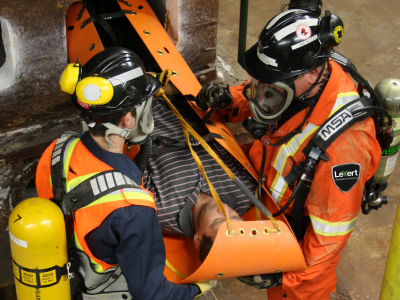A Sudbury occupational health and safety company is offering real-life training scenarios for companies working in confined spaces.
Levert WorkSafe Services has developed a training simulator that mirrors situations that rescuers and tradespeople will encounter on the job site.
The company is a spinoff health and safety training division of the Levert Group, a well-known personnel resources firm.
In 2006, Ontario introduced tougher and expanded confined space regulations – enforced by the Ministry of Labour (MOL) – in the construction, health care, industrial, mining and other previously not covered sectors.
It meant more stringent standards being placed on employers to come up with plans on how to enter a confined space, conduct site hazard assessments, develop strategies on how to control hazards, provide the necessary training, and then back it all up with records.
A confined space is considered inside tanks, drums, silos, culverts or tunnels.
Senior instructor Richard Eldridge said when the MOL began cracking down on confined space procedures, Levert saw an opportunity to offer this unique service.
“We see the necessity and any time we get notification of safety blitzes that c
ome around throughout Ontario, we approach small companies that are still behind the eight-ball to catch up to where the bigger companies are.
“There's always a learning curve that some companies are slow to jump on and that's where we come into play and why we have people to educate them.”
The company has seven years' experience acting as teachers teaching rescue teams for major clients like Vale and Xstrata, and contractors across Northern Ontario, ut also to assist small and medium-sized companies fulfill their occupational health and safety needs.
Eldridge said the participation from companies has been great.
“They know the need for it.”
At their Frood Road location, the company repurposed an old boiler room into a 292-square-foot confined space simulator that's outfitted with a myriad of obstacles and entanglements that tradespeople, contractors or rescuers would face on a daily basis or in an emergency situation.
“It was an opportunity to take our programming to the next level,” said Eldridge, who's also a Greater Sudbury firefighter.
This kind of training is crucial to industry since about half of the deaths related to confined spaces are due to oxygen deficiency and lack of air testing. The simulator educates workers about occupational hazards and how to respond to them.
Levert trains client groups and their own in-house personnel on how to react within seconds during life-or-death situations. The scenarios can involve locating and recovering a mannequin in a dark or smoke-filled situation.
“We have a standard that our rescuers maintain even though they've been through the week-long course. Our requirements are to maintain their rescue status with four practical training sessions throughout the year.”
The confined space rescue training course runs six to eight times a year, usually during mine maintenance shutdowns for clients such as Vale and Xstrata.
“All our rescue teams, attendants and labourers – if they're going to enter a confined space – have to understand the permits which is part of the confined space package.”
Aside from confined space training, the company delivers a broad range of comprehensive safety programs and can customize training packages to ensure employers are complaint with Workplace Safety and Insurance Board standards.
Their training offerings include aerial work platforms, fall arrest, lift trucks, gas detection, respiratory awareness, ladder safety, workplace violence, even black bear awareness.
Levert works with companies to conduct safety audits, identify training needs, devise policies and procedures for accident investigation, emergency planning, workplace inspections, job hazard analysis, first aid and medical procedures, training and documentation, safety manuals, and in establishing health and safety committees.




